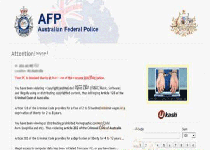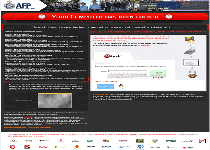Australian Federal Police Ukash Virus
Posted: September 25, 2012
Threat Metric
The following fields listed on the Threat Meter containing a specific value, are explained in detail below:
Threat Level: The threat level scale goes from 1 to 10 where 10 is the highest level of severity and 1 is the lowest level of severity. Each specific level is relative to the threat's consistent assessed behaviors collected from SpyHunter's risk assessment model.
Detection Count: The collective number of confirmed and suspected cases of a particular malware threat. The detection count is calculated from infected PCs retrieved from diagnostic and scan log reports generated by SpyHunter.
Volume Count: Similar to the detection count, the Volume Count is specifically based on the number of confirmed and suspected threats infecting systems on a daily basis. High volume counts usually represent a popular threat but may or may not have infected a large number of systems. High detection count threats could lay dormant and have a low volume count. Criteria for Volume Count is relative to a daily detection count.
Trend Path: The Trend Path, utilizing an up arrow, down arrow or equal symbol, represents the level of recent movement of a particular threat. Up arrows represent an increase, down arrows represent a decline and the equal symbol represent no change to a threat's recent movement.
% Impact (Last 7 Days): This demonstrates a 7-day period change in the frequency of a malware threat infecting PCs. The percentage impact correlates directly to the current Trend Path to determine a rise or decline in the percentage.
| Threat Level: | 10/10 |
|---|---|
| Infected PCs: | 66 |
| First Seen: | September 25, 2012 |
|---|---|
| OS(es) Affected: | Windows |
 The Australian Federal Police Ukash Virus is a ransomware Trojan that blocks the Windows interface by displaying a fraudulent legal alert and requesting that you pay a fine through Ukash. Although the Australian Federal Police Ukash Virus uses an alert that's tailored to Australian audiences and makes false claims of being sent by the real AFP, SpywareRemove.com malware researchers have noted strong similarities between the Australian Federal Police Ukash Virus and other ransomware Trojans (such as the 'Der Computer Ist Fr Die Verletzung Der Gesetze Der Republik Sterreich Blockiert Worden' Trojan) that are indicative of variants being distributed in other countries. Since the Australian Federal Police Ukash Virus isn't affiliated with any type of real police form and is, itself, illegal, you should, first of all, avoid paying its fee, and secondly, remove the Australian Federal Police Ukash Virus with anti-malware software as described further in this article.
The Australian Federal Police Ukash Virus is a ransomware Trojan that blocks the Windows interface by displaying a fraudulent legal alert and requesting that you pay a fine through Ukash. Although the Australian Federal Police Ukash Virus uses an alert that's tailored to Australian audiences and makes false claims of being sent by the real AFP, SpywareRemove.com malware researchers have noted strong similarities between the Australian Federal Police Ukash Virus and other ransomware Trojans (such as the 'Der Computer Ist Fr Die Verletzung Der Gesetze Der Republik Sterreich Blockiert Worden' Trojan) that are indicative of variants being distributed in other countries. Since the Australian Federal Police Ukash Virus isn't affiliated with any type of real police form and is, itself, illegal, you should, first of all, avoid paying its fee, and secondly, remove the Australian Federal Police Ukash Virus with anti-malware software as described further in this article.
Australian Federal Police Ukash Virus: the Trojan That Uses Every Excuse at Its Disposal
While more believable ransomware scams will stick to specific charges or word their threats in a vague fashion, the accompanying pop-up alert for the Australian Federal Police Ukash Virus uses a number of different accusations – presumably in a desperate attempt to find something that any given victim is guilty of committing. The Australian Federal Police Ukash Virus accuses your PC of being used to view illegal pornography, distribute spam and infringe on media copyrights, and, supposedly, has locked your computer to prevent further crimes. The official AFP logo also is used to make Australian Federal Police Ukash Virus appear to be legitimate.
In spite of these frantically-inclusive trappings, SpywareRemove.com malware analysts have confirmed that Australian Federal Police Ukash Virus is just a variant of similar ransomware-based PC threats like the 'Der Computer Ist Fr Die Verletzung Der Gesetze Der Republik Sterreich Blockiert Worden' Trojan, West Yorkshire Ransomware, 'Interpol Department of Cybercrime' Ransomware, the United States Cyber Security Virus, the Gema 'Access to your computer was denied' Virus, etc.
Although the Australian Federal Police Ukash Virus and its relatives are often referred to broadly as viruses, it should be emphasized that they have, so far, been found to lack any form of self-propagation, including infecting large swathes of files in the fashion of a virus. Likewise, the Australian Federal Police Ukash Virus does not appear to be able to distribute itself through networks or removable drive devices, although related PC threats may be designed with distributing the Australian Federal Police Ukash Virus in mind.
Sending the Australian Federal Police Ukash Virus to Your Personal Jail (AKA, the Recycling Bin)
The Australian Federal Police Ukash Virus launches with Windows and claims that your PC will remain frozen (in addition to other types of impending legal penalties, such as jail time) until you pay its Ukash fee. SpywareRemove.com malware researchers strongly discourage paying this fee, since there's no certainty that the Australian Federal Police Ukash Virus will unlock your computer and since the Australian Federal Police Ukash Virus has no affiliation with real law enforcement.
Because Australian Federal Police Ukash Virus's pop-up will block you from using other programs or, in fact, any other part of your PC, you should try to disable the Australian Federal Police Ukash Virus by launching in Safe Mode. In cases where Safe Mode fails to block Australian Federal Police Ukash Virus's startup routine, SpywareRemove.com malware experts can recommend a USB drive-based system boot as a certain solution. After the Australian Federal Police Ukash Virus fails to show its pop-up, you can remove the Australian Federal Police Ukash Virus with any good anti-malware software that's at your disposal.

Use SpyHunter to Detect and Remove PC Threats
If you are concerned that malware or PC threats similar to Australian Federal Police Ukash Virus may have infected your computer, we recommend you start an in-depth system scan with SpyHunter. SpyHunter is an advanced malware protection and remediation application that offers subscribers a comprehensive method for protecting PCs from malware, in addition to providing one-on-one technical support service.
* See Free Trial offer below. EULA and Privacy/Cookie Policy.
Why can't I open any program including SpyHunter? You may have a malware file running in memory that kills any programs that you try to launch on your PC. Tip: Download SpyHunter from a clean computer, copy it to a USB thumb drive, DVD or CD, then install it on the infected PC and run SpyHunter's malware scanner.
Leave a Reply
Please note that we are not able to assist with billing and support issues regarding SpyHunter or other products. If you're having issues with SpyHunter, please get in touch with SpyHunter customer support through your SpyHunter . If you have SpyHunter billing questions, we recommend you check the Billing FAQ. For general suggestions or feedback, contact us.